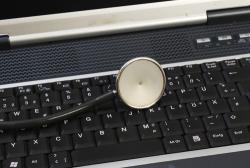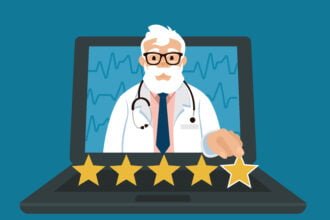 Health professionals are on the frontline of care. They splint broken bones, prescribe medicines for coughs, and operate on failing organs. In many situations, they work in reaction to an illness, an injury, or a harmful condition. They serve as advisors and guides, helping patients recover, get healthy, and go back to their lives.
Health professionals are on the frontline of care. They splint broken bones, prescribe medicines for coughs, and operate on failing organs. In many situations, they work in reaction to an illness, an injury, or a harmful condition. They serve as advisors and guides, helping patients recover, get healthy, and go back to their lives.
 Health professionals are on the frontline of care. They splint broken bones, prescribe medicines for coughs, and operate on failing organs. In many situations, they work in reaction to an illness, an injury, or a harmful condition. They serve as advisors and guides, helping patients recover, get healthy, and go back to their lives. But what if health professionals were able to work proactively with their patients?
Health professionals are on the frontline of care. They splint broken bones, prescribe medicines for coughs, and operate on failing organs. In many situations, they work in reaction to an illness, an injury, or a harmful condition. They serve as advisors and guides, helping patients recover, get healthy, and go back to their lives. But what if health professionals were able to work proactively with their patients?
The world is now full of new technologies, instant communication, and wearable devices that monitor health data in real time outside of the doctor’s office or hospital. As this technology changes our daily lives, healthcare professionals must adapt to a new reality in medicine — a patient-centric healthcare model.
To help patients reach and maintain their optimum level of health, healthcare professionals need to support and utilize the tools gaining prominence in our tech-savvy society. More importantly, they need to become primary motivators in healthy living, not just advisors in times of need.
Tools for Building Proactive Patients
Many tools and technologies are available for patients to make the process of getting and staying healthy easier (and sometimes even enjoyable!), including:
Wearable technology: Wearable technology has become increasingly popular over the past decade as devices have become more convenient and fun. These gadgets can track sleep, nutrition, water intake, and exercise. Many have interactive apps and websites that add to the user experience. These devices are a great way for users to become more aware of their health and fitness, and they motivate users to strive to outdo their previous accomplishments.
Medication reminders: Following medication requirements can be difficult for patients once they leave the office. GlowCaps are placed over the lids of prescription pill bottles and synced with a smartphone or a wireless light in patients’ homes to remind them to take their medication at a specified time.
PillPack aims to simplify the entire prescription process by making it easier to order, receive, and actually take medication. The medication can be delivered to the patient’s door in convenient, clearly labeled packets. Both of these innovative tools take the hassle out of medication sorting and scheduling for busy or forgetful patients.
Telemedicine resources: Nearly everyone has experienced a health concern that needs quick attention, only to find that the doctor can’t return a call immediately. New telemedicine solutions like HealthTap, Doctor On Demand, and First Opinion help put patients in touch with experienced physicians through phone, text, or online chatting. MedWhat offers valuable information that helps patients decipher confusing medical jargon. These resources may not be fun games, but they quickly satisfy patients’ needs and provide instant feedback.
Nutrition guides: Nutrition is at the root of most chronic health problems, yet diet is a hard habit to change. Fads come and go. Counting calories or keeping food journals can be a lot of work.
A new company called Rise is simplifying nutrition by allowing users to take pictures of their food and get feedback on their diet from a personal nutritionist. So instead of posting pictures of meals to Instagram, users can get useful tips and advice that helps them stay on track to meet their nutrition goals.
Rewards programs: Getting fit is a lot more fun when there’s an incentive behind it. Many people excel when challenged, and rewards programs are a great way to receive prizes for being active and healthy. Whether it’s a customized group program through an employer or individuals looking for a challenge, sites like EveryMove, AchieveMint, and Earndit can provide extra monetary motivation to get users going.
Practical Advice for Professionals
A new healthcare model means an adjustment period for healthcare professionals. Here are a few tips for this transition:
1. Technology is your friend. Patients are using technology to guide and advise them on their health and fitness. While many experts might see these programs and devices as disruptive to the healthcare system, they can be incredibly beneficial for building strong patient-physician relationships. Utilize the in-depth information these technologies provide, and discuss with your patients how they can get the most out of various devices in fun, proactive ways.
2. Encourage lifestyle changes. Many patients struggle to stick to a health plan because they fail to understand that quick fixes don’t guarantee long-term improvements. Encouraging patients to make lifestyle and behavioral changes is prevalent in most health plans, but old habits can be difficult to break.
Educate patients on how to identify and change or replace their harmful behaviors. Encourage them to stay motivated in their quest to improve their long-term health.
3. Utilize online resources. Many Americans turn to the Internet for their health-related questions and concerns, largely because of the convenience and timely information. Offering your patients online access to your guidance is a great way to get your advice, opinions, and information to them efficiently.
Actively connect with them on social media, start a blog, or offer options to communicate via email or text. If you want to be your patients’ most trusted advisor and motivator, you’ve got to be as accessible as WebMD.
Healthcare professionals are certainly not going to be replaced by technology, but they must take advantage of programs and devices that can help them treat and motivate their patients better. By educating patients and embracing health technology, they can help make healthier living fun, which increases the chances that patients will make their health a priority.
(telemedicine / shutterstock)








